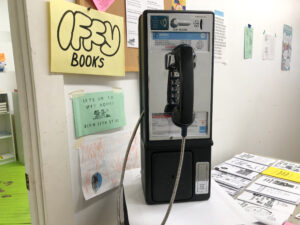In the comic book world, it’s considered the Superman Conundrum. Now that there are no more phone booths, where does Clark Kent go to turn into the Man of Steel?
Delaware County resident Mike Dank can’t solve the phone booth problem, but he is doing something about the phone.
While payphones are being removed from service worldwide, Dank and his tech partner Naveen Albert have started the PhilTel project to put them back in use. The duo retrofits old payphones with voice-over-internet protocol (VOIP) devices.
Payphones that would otherwise be destined for the landfill can easily be adapted to provide calls over the internet using the technology. The software will let a user call for free with internet access.
A few years ago, the DelVal resident first heard of a similar project in Portland, Ore. In 2014, a resident there installed a free, public phone on his property. Interest grew, as did the collection of phones, in a project now called Futel.
Dank was always utilizing older forms of technology to learn more obscure bits of computing and decided to try out the Futel technology on an old payphone in his basement.
“We had both been aware of Futel for some time, and we thought we would create a similar project in Philadelphia,” Dank said. “Luckily, I had an old, non-working payphone that we could use as our first phone and quickly secured a first location for it at Iffy Books, a great community bookstore in the Callowhill neighborhood of Philadelphia.”
Dank runs a website called networksofphilly.org, where he met Albert, his co-founder. Albert, 21, is a student at the University of Pennsylvania who has taken some personal stake in this project.
“Naveen has been great to work with, and I think this is a result of our friendship over the past few years,” Dank said. “Though I have a professional background in software engineering, I tend to focus more on the hardware and networking facets while Naveen focuses on the software and communications.”
Albert doesn’t own a cell phone but uses a landline in his dorm room as his main form of communication. While out in public, Albert relies heavily on the remaining few pay phones in the city.
“With Naveen not having a cell phone himself, he understands what it’s like to navigate and communicate within Philadelphia without one,” Dank said.
The PhilTel phones also touch on an essential aspect for many Philadelphia residents which is accessibility. Dank and Albert looked at research that shows 97 percent of Americans have a cell phone.
But specifically in Philly, there could be as many as 50,000 residents who don’t own a cell phone. As payphones disappear, thousands of people are losing access to cheaper communication.
“Anyone who can use a phone could benefit from PhilTel,” Dank said. “While PhilTel may most benefit people who cannot afford or otherwise don’t use a mobile phone, it also appeals to the those who have had their mobile phones run out of battery or otherwise malfunction.”
While PhilTel currently only has one phone operating in Philadelphia, they are considering future locations in other neighborhoods within the city, including Cedar Park, East Kensington, and South Philadelphia.
“We currently have no plans to expand into the suburbs, but that is definitely an option in the future,” Dank said. “We have also had some interest in having phones installed just over the river in New Jersey, but we’re keeping things within the city for now.”
Please follow DVJournal on social media: Twitter@DVJournal or Facebook.com/DelawareValleyJournal

